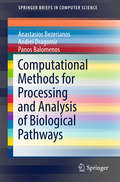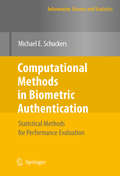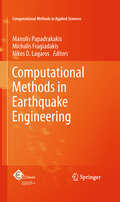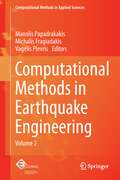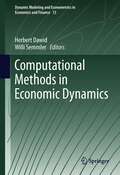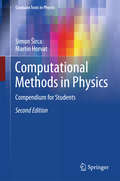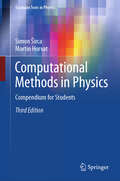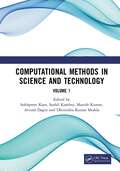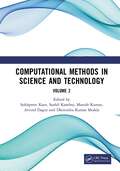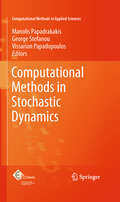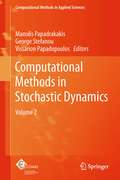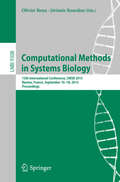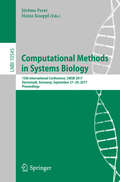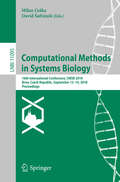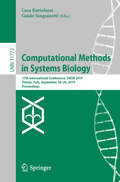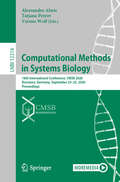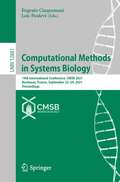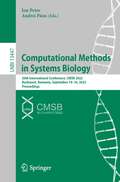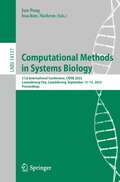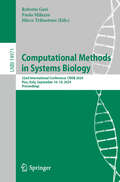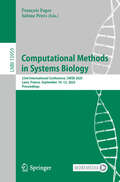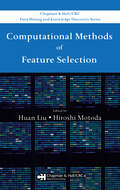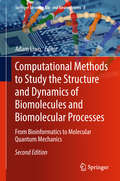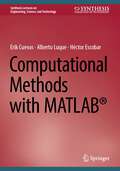- Table View
- List View
Computational Methods for Processing and Analysis of Biological Pathways (SpringerBriefs in Computer Science)
by Anastasios Bezerianos Andrei Dragomir Panos BalomenosThis work offers a guided walkthrough of one of the most promising research areas in modern life sciences, enabling a deeper understanding of involved concepts and methodologies via an interdisciplinary view, focusing on both well-established approaches and cutting-edge research. Highlighting what pathway analysis can offer to both the experimentalist and the modeler, the text opens with an introduction to a general methodology that outlines common workflows shared by several methods. This is followed by a review of pathway and sub-pathway based approaches for systems pharmacology. The work then presents an overview of pathway analysis methods developed to model the temporal aspects of drug- or disease-induced perturbations and extract relevant dynamic themes. The text concludes by discussing several state-of-the-art methods in pathway analysis, which address the important problem of identifying differentially expressed pathways and sub-pathways.
Computational Methods in Biometric Authentication: Statistical Methods for Performance Evaluation (Information Science and Statistics)
by Michael E. SchuckersBiometrics, the science of using physical traits to identify individuals, is playing an increasing role in our security-conscious society and across the globe. Biometric authentication, or bioauthentication, systems are being used to secure everything from amusement parks to bank accounts to military installations. Yet developments in this field have not been matched by an equivalent improvement in the statistical methods for evaluating these systems. Compensating for this need, this unique text/reference provides a basic statistical methodology for practitioners and testers of bioauthentication devices, supplying a set of rigorous statistical methods for evaluating biometric authentication systems. This framework of methods can be extended and generalized for a wide range of applications and tests. This is the first single resource on statistical methods for estimation and comparison of the performance of biometric authentication systems. The book focuses on six common performance metrics: for each metric, statistical methods are derived for a single system that incorporates confidence intervals, hypothesis tests, sample size calculations, power calculations and prediction intervals. These methods are also extended to allow for the statistical comparison and evaluation of multiple systems for both independent and paired data. Topics and features: * Provides a statistical methodology for the most common biometric performance metrics: failure to enroll (FTE), failure to acquire (FTA), false non-match rate (FNMR), false match rate (FMR), and receiver operating characteristic (ROC) curves * Presents methods for the comparison of two or more biometric performance metrics * Introduces a new bootstrap methodology for FMR and ROC curve estimation * Supplies more than 120 examples, using publicly available biometric data where possible * Discusses the addition of prediction intervals to the bioauthentication statistical toolset * Describes sample-size and power calculations for FTE, FTA, FNMR and FMR Researchers, managers and decisions makers needing to compare biometric systems across a variety of metrics will find within this reference an invaluable set of statistical tools. Written for an upper-level undergraduate or master's level audience with a quantitative background, readers are also expected to have an understanding of the topics in a typical undergraduate statistics course. Dr. Michael E. Schuckers is Associate Professor of Statistics at St. Lawrence University, Canton, NY, and a member of the Center for Identification Technology Research.
Computational Methods in Earthquake Engineering: Volume 2 (Computational Methods in Applied Sciences #21)
by Manolis Papadrakakis Nikos D. Lagaros Michalis FragiadakisThis book provides an insight in advanced methods and concepts for structural analysis and design against seismic loading. The book consists of 25 chapters dealing with a wide range of timely issues in contemporary Earthquake Engineering. In brief, the topics covered are: collapse assessment, record selection, effect of soil conditions, problems in seismic design, protection of monuments, earth dam structures and liquid containers, numerical methods, lifetime assessment, post-earthquake measures. A common ground of understanding is provided between the communities of Earth Sciences and Computational Mechanics towards mitigating seismic risk. The topic is of great social and scientific interest, due to the large number of scientists and practicing engineers currently working in the field and due to the great social and economic consequences of earthquakes.
Computational Methods in Earthquake Engineering: Volume 2 (Computational Methods in Applied Sciences #30)
by Manolis Papadrakakis Michalis Fragiadakis Vagelis PlevrisThis book provides an insight on advanced methods and concepts for the design and analysis of structures against earthquake loading. This second volume is a collection of 28 chapters written by leading experts in the field of structural analysis and earthquake engineering. Emphasis is given on current state-of-the-art methods and concepts in computing methods and their application in engineering practice. The book content is suitable for both practicing engineers and academics, covering a wide variety of topics in an effort to assist the timely dissemination of research findings for the mitigation of seismic risk. Due to the devastating socioeconomic consequences of seismic events, the topic is of great scientific interest and is expected to be of valuable help to scientists and engineers. The chapters of this volume are extended versions of selected papers presented at the COMPDYN 2011 conference, held in the island of Corfu, Greece, under the auspices of the European Community on Computational Methods in Applied Sciences (ECCOMAS).
Computational Methods in Economic Dynamics: Computational Methods In Economic Dynamics (Dynamic Modeling and Econometrics in Economics and Finance #13)
by Willi Semmler Herbert DawidThis volume is centered around the issue of market design and resulting market dynamics. The economic crisis of 2007-2009 has once again highlighted the importance of a proper design of market protocols and institutional details for economic dynamics and macroeconomics. Papers in this volume capture institutional details of particular markets, behavioral details of agents' decision making as well as spillovers between markets and effects to the macroeconomy. Computational methods are used to replicate and understand market dynamics emerging from interaction of heterogeneous agents, and to develop models that have predictive power for complex market dynamics. Finally treatments of overlapping generations models and differential games with heterogeneous actors are provided.
Computational Methods in Physics: Compendium for Students (Graduate Texts in Physics)
by Martin Horvat Simon ŠircaThis book is intended to help advanced undergraduate, graduate, and postdoctoral students in their daily work by offering them a compendium of numerical methods. The choice of methods pays significant attention to error estimates, stability and convergence issues, as well as optimization of program execution speeds. Numerous examples are given throughout the chapters, followed by comprehensive end-of-chapter problems with a more pronounced physics background, while less stress is given to the explanation of individual algorithms. The readers are encouraged to develop a certain amount of skepticism and scrutiny instead of blindly following readily available commercial tools. The second edition has been enriched by a chapter on inverse problems dealing with the solution of integral equations, inverse Sturm-Liouville problems, as well as retrospective and recovery problems for partial differential equations. The revised text now includes an introduction to sparse matrix methods, the solution of matrix equations, and pseudospectra of matrices; it discusses the sparse Fourier, non-uniform Fourier and discrete wavelet transformations, the basics of non-linear regression and the Kolmogorov-Smirnov test; it demonstrates the key concepts in solving stiff differential equations and the asymptotics of Sturm-Liouville eigenvalues and eigenfunctions. Among other updates, it also presents the techniques of state-space reconstruction, methods to calculate the matrix exponential, generate random permutations and compute stable derivatives.
Computational Methods in Physics: Compendium for Students (Graduate Texts in Physics)
by Martin Horvat Simon ŠircaThis textbook provides a compendium of numerical methods to assist physics students and researchers in their daily work. It carefully considers error estimates, stability and convergence issues, the choice of optimal methods, and techniques to increase program execution speeds. The book supplies numerous examples throughout the chapters that are concluded by more comprehensive problems with a strong physics background. Instead of uncritically employing modern black-box tools, the readers are encouraged to develop a more ponderous and skeptical approach. This revised and expanded edition now includes a new chapter on numerical integration and stable differentiation, as well as fresh material on optimal filtering, integration of gravitational many-body problems, computation of Poincaré maps, regularization of orbits, singular Sturm-Liouville problems, techniques for time evolution and spatial treatment of (semi)infinite domains in spectral methods, and phase retrieval. It also brings updated discussions of algebraic problems involving sparse matrices and of high-resolution schemes for partial differential equations.
Computational Methods in Plasma Physics (Chapman & Hall/CRC Computational Science)
by Stephen JardinAssuming no prior knowledge of plasma physics or numerical methods, Computational Methods in Plasma Physics covers the computational mathematics and techniques needed to simulate magnetically confined plasmas in modern magnetic fusion experiments and future magnetic fusion reactors. Largely self-contained, the text presents the basic concepts neces
Computational Methods in Science and Technology: Proceedings of the 4th International Conference on Computational Methods in Science & Technology (ICCMST 2024), 2–3 May 2024, Mohali, India, Volume 1
by Manish Kumar Arvind Dagur Dhirendra Kumar Shukla Sukhpreet Kaur Sushil KambojThis book contains the proceedings of the 4TH International Conference on Computational Methods in Science and Technology (ICCMST 2024).The proceedings explores research and innovation in the field of Internet of things, Cloud Computing, Machine Learning, Networks, System Design and Methodologies, Big Data Analytics and Applications, ICT for Sustainable Environment, Artificial Intelligence and it provides real time assistance and security for advanced stage learners, researchers and academicians has been presented.This will be a valuable read to researchers, academicians, undergraduate students, postgraduate students, and professionals within the fields of Computer Science, Sustainability and Artificial Intelligence.
Computational Methods in Science and Technology: Proceedings of the 4th International Conference on Computational Methods in Science & Technology (ICCMST 2024), 2–3 May 2024, Mohali, India, Volume 2
by Manish Kumar Arvind Dagur Dhirendra Kumar Shukla Sukhpreet Kaur Sushil KambojThis book contains the proceedings of the 4TH International Conference on Computational Methods in Science and Technology (ICCMST 2024).The proceedings explores research and innovation in the field of Internet of things, Cloud Computing, Machine Learning, Networks, System Design and Methodologies, Big Data Analytics and Applications, ICT for Sustainable Environment, Artificial Intelligence and it provides real time assistance and security for advanced stage learners, researchers and academicians has been presented.This will be a valuable read to researchers, academicians, undergraduate students, postgraduate students, and professionals within the fields of Computer Science, Sustainability and Artificial Intelligence.
Computational Methods in Stochastic Dynamics: Volume 2 (Computational Methods in Applied Sciences #22)
by Manolis Papadrakakis George Stefanou Vissarion PapadopoulosAt the dawn of the 21st century, computational stochastic dynamics is an emerging research frontier. This book focuses on advanced computational methods and software tools which can highly assist in tackling complex problems in stochastic dynamic/seismic analysis and design of structures. The book is primarily intended for researchers and post-graduate students in the fields of computational mechanics and stochastic structural dynamics. Nevertheless, practice engineers as well could benefit from it as most code provisions tend to incorporate probabilistic concepts in the analysis and design of structures. The book addresses mathematical and numerical issues in stochastic structural dynamics and connects them to real-world applications. It consists of 16 chapters dealing with recent advances in a wide range of related topics (dynamic response variability and reliability of stochastic systems, risk assessment, stochastic simulation of earthquake ground motions, efficient solvers for the analysis of stochastic systems, dynamic stability, stochastic modelling of heterogeneous materials). Numerical examples demonstrating the significance of the proposed methods are presented in each chapter.
Computational Methods in Stochastic Dynamics: Volume 2 (Computational Methods in Applied Sciences #26)
by Manolis Papadrakakis George Stefanou Vissarion PapadopoulosThe considerable influence of inherent uncertainties on structural behavior has led the engineering community to recognize the importance of a stochastic approach to structural problems. Issues related to uncertainty quantification and its influence on the reliability of the computational models are continuously gaining in significance. In particular, the problems of dynamic response analysis and reliability assessment of structures with uncertain system and excitation parameters have been the subject of continuous research over the last two decades as a result of the increasing availability of powerful computing resources and technology. This book is a follow up of a previous book with the same subject (ISBN 978-90-481-9986-0) and focuses on advanced computational methods and software tools which can highly assist in tackling complex problems in stochastic dynamic/seismic analysis and design of structures. The selected chapters are authored by some of the most active scholars in their respective areas and represent some of the most recent developments in this field. The book consists of 21 chapters which can be grouped into several thematic topics including dynamic analysis of stochastic systems, reliability-based design, structural control and health monitoring, model updating, system identification, wave propagation in random media, seismic fragility analysis and damage assessment. This edited book is primarily intended for researchers and post-graduate students who are familiar with the fundamentals and wish to study or to advance the state of the art on a particular topic in the field of computational stochastic structural dynamics. Nevertheless, practicing engineers could benefit as well from it as most code provisions tend to incorporate probabilistic concepts in the analysis and design of structures.
Computational Methods in Systems Biology: 13th International Conference, CMSB 2015, Nantes, France, September 16-18, 2015, Proceedings (Lecture Notes in Computer Science #9308)
by Olivier Roux Jérémie BourdonThis book constitutes the refereed proceedings of the 13th International Conference on Computational Methods in Systems Biology, CMSB 2015, held in Nantes, France, in September 2015. The 20 full papers and 2 short papers presented were carefully reviewed and selected from 43 full and 4 short paper submissions. The papers cover a wide range of topics in the analysis of biological systems, networks and data such as model checking, stochastic analysis, hybrid systems, circadian clock, time series data, logic programming, and constraints solving ranging from intercellular to multiscale.
Computational Methods in Systems Biology: 15th International Conference, CMSB 2017, Darmstadt, Germany, September 27–29, 2017, Proceedings (Lecture Notes in Computer Science #10545)
by Heinz Koeppl Jérôme FeretThis book constitutes the refereed proceedings of the 15th International Conference on Computational Methods in Systems Biology, CMSB 2017, held in Darmstadt, Germany, in September 2017. The 15 full papers, 4 tool papers and 4 posters presented together with 1 invited talk were carefully reviewed and selected from 41 regular paper submissions. Topics of interest include formalisms for modeling biological processes; models and their biological applications; frameworks for model verication, validation, analysis, and simulation of biological systems; high-performance computational systems biology and parallel implementations; model inference from experimental data; model integration from biological databases; multi-scale modeling and analysis methods; and computational approaches for synthetic biology.
Computational Methods in Systems Biology: 16th International Conference, CMSB 2018, Brno, Czech Republic, September 12-14, 2018, Proceedings (Lecture Notes in Computer Science #11095)
by David Šafránek Milan ČeškaThis book constitutes the refereed proceedings of the 16th International Conference on Computational Methods in Systems Biology, CMSB 2018, held in BRNO, Czech Republic, in September 2018. The 15 full and 7 short papers presented together with 5 invited talks were carefully reviewed and selected from 46 submissions. Topics of interest include formalisms for modeling biological processes; models and their biological applications; frameworks for model verification, validation, analysis, and simulation of biological systems; high-performance computational systems biology; parameter and model inference from experimental data; automated parameter and model synthesis; model integration and biological databases; multi-scale modeling and analysis methods; design, analysis, and verification methods for synthetic biology; methods for biomolecular computing and engineered molecular devices.Chapters 3, 9 and 10 are available open access under a Creative Commons Attribution 4.0 International License via link.springer.com.
Computational Methods in Systems Biology: 17th International Conference, CMSB 2019, Trieste, Italy, September 18–20, 2019, Proceedings (Lecture Notes in Computer Science #11773)
by Guido Sanguinetti Luca BortolussiThis book constitutes the refereed proceedings of the 17th International Conference on Computational Methods in Systems Biology, CMSB 2019, held in Trieste, Italy, in September 2019.The 14 full papers, 7 tool papers and 11 posters were carefully reviewed and selected from 53 submissions. Topics of interest include formalisms for modeling biological processes; models and their biological applications; frameworks for model verification, validation, analysis, and simulation of biological systems; high-performance computational systems biology and parallel implementations; model inference from experimental data; model integration from biological databases; multi-scale modeling and analysis methods; computational approaches for synthetic biology; and case studies in systems and synthetic biology.
Computational Methods in Systems Biology: 18th International Conference, CMSB 2020, Konstanz, Germany, September 23–25, 2020, Proceedings (Lecture Notes in Computer Science #12314)
by Alessandro Abate Verena Wolf Tatjana PetrovThis book constitutes the refereed proceedings of the 18th International Conference on Computational Methods in Systems Biology, CMSB 2020, held in Konstanz, Germany, in September 2020.*The 17 full papers and 5 tool papers were carefully reviewed and selected from 30 submissions. In addition 3 abstracts of invited talks and 2 tutorials have been included in this volume. Topics of interest include formalisms for modeling biological processes; models and their biological applications; frameworks for model verification, validation, analysis, and simulation of biological systems; high-performance computational systems biology and parallel implementations; model inference from experimental data; model integration from biological databases; multi-scale modeling and analysis methods; computational approaches for synthetic biology; and case studies in systems and synthetic biology. * The conference was held virtually due to the COVID-19 pandemic.
Computational Methods in Systems Biology: 19th International Conference, CMSB 2021, Bordeaux, France, September 22–24, 2021, Proceedings (Lecture Notes in Computer Science #12881)
by Eugenio Cinquemani Loïc PaulevéThis book constitutes the refereed proceedings of the 19th International Conference on Computational Methods in Systems Biology, CMSB 2021, held in Bordeaux, France, September 22–24, 2021.*The 13 full papers and 5 tool papers were carefully reviewed and selected from 32 submissions. The topics of interest include biological process modelling; biological system model verification, validation, analysis, and simulation; high-performance computational systems biology; model inference from experimental data; multi-scale modeling and analysis methods; computational approaches for synthetic biology; machine learning and data-driven approaches; microbial ecology modelling and analysis; methods and protocols for populations and their variability; models, applications, and case studies in systems and synthetic biology. The chapters "Microbial Community Decision Making Models in Batch", "Population design for synthetic gene circuits", "BioFVM-X: An MPI+OpenMP 3-D Simulator for Biological Systems" are published open access under a CC BY license (Creative Commons Attribution 4.0 International License). * The conference was held in a hybrid mode due to the COVID-19 pandemic.
Computational Methods in Systems Biology: 20th International Conference, CMSB 2022, Bucharest, Romania, September 14–16, 2022, Proceedings (Lecture Notes in Computer Science #13447)
by Ion Petre Andrei PăunThis book constitutes the refereed proceedings of the 20th International Conference on Computational Methods in Systems Biology, CMSB 2022, held in Bucharest, Romania, in September 2022.The 13 full papers and 4 tool papers were carefully reviewed and selected from 43 submissions. CMSB focuses on modeling, simulation, analysis, design and control of biological systems. The papers are arranged thematically as follows: Chemical reaction networks; Boolean networks; continuous and hybrid models; machine learning; software.
Computational Methods in Systems Biology: 21st International Conference, CMSB 2023, Luxembourg City, Luxembourg, September 13–15, 2023, Proceedings (Lecture Notes in Computer Science #14137)
by Jun Pang Joachim NiehrenThis book constitutes the refereed proceedings of the 21st International Conference on Computational Methods in Systems Biology, CMSB 2023, held in Luxembourg City, Luxembourg, during September 13–15, 2023. The 14 full papers and 3 tool papers presented in this book were carefully reviewed and selected from 28 submissions. CMSB focuses on modeling, simulation, analysis, design and control of biological systems and covers the broad field of computational methods and tools in systems and synthetic biology and their applications.
Computational Methods in Systems Biology: 22nd International Conference, CMSB 2024, Pisa, Italy, September 16–18, 2024, Proceedings (Lecture Notes in Computer Science #14971)
by Paolo Milazzo Mirco Tribastone Roberta GoriThis book constitutes the refereed proceedings of the 22nd International Conference on Computational Methods in Systems Biology, CMSB 2024, which took place in Pisa, Italy, during September 16-18, 2024. The 11 full papers included in this book were carefully reviewed and selected from 23 submissions. They deal with computational methods and tools in systems and synthetic biology and their applications, focusing on topics such as modeling and simulation; high-performance methods for computational systems biology; identification of biological systems; applications of machine learning; network modeling, analysis, and inference; automated parameter and model synthesis; model integration and biological databases; multiscale modeling and analysis methods; design, analysis, and verification methods for synthetic biology; methods for biomolecular computing and engineered molecular devices; data-based approaches for systems and synthetic biology; optimality and control of biological systems; modeling, analysis, and control of microbial communities. The conference welcomes new theoretical results with potential applications to systems and synthetic biology, as well as novel applications and case studies of existing methods, tools, or frameworks.
Computational Methods in Systems Biology: 23rd International Conference, CMSB 2025, Lyon, France, September 10–12, 2025, Proceedings (Lecture Notes in Computer Science #15959)
by François Fages Sabine PérèsThis book constitutes the refereed proceedings of the 23rd International Conference on Computational Methods in Systems Biology, CMSB 2025, which took place in Lyon, France, during September 10–12, 2025. The 21 full papers presented in this volume were carefully reviewed and selected from 34 submissions sent to reviews. They are grouped into the following topics: Boolean Networks; Continuous and Hybrid models; Rule-based models; Model inference and machine learning; Population models and control.
Computational Methods of Feature Selection (Chapman & Hall/CRC Data Mining and Knowledge Discovery Series)
by Huan Liu Hiroshi MotodaDue to increasing demands for dimensionality reduction, research on feature selection has deeply and widely expanded into many fields, including computational statistics, pattern recognition, machine learning, data mining, and knowledge discovery. Highlighting current research issues, Computational Methods of Feature Selection introduces the
Computational Methods to Study the Structure and Dynamics of Biomolecules and Biomolecular Processes: From Bioinformatics to Molecular Quantum Mechanics (Springer Series on Bio- and Neurosystems #8)
by Adam LiwoThis book provides a comprehensive overview of modern computer-based techniques for analyzing the structure, properties and dynamics of biomolecules and biomolecular processes. It is organized in four main parts; the first one deals with methodology of molecular simulations; the second one with applications of molecular simulations; the third one introduces bioinformatics methods and the use of experimental information in molecular simulations; the last part reports on selected applications of molecular quantum mechanics. This second edition has been thoroughly revised and updated to include the latest progresses made in the respective field of research.
Computational Methods with MATLAB® (Synthesis Lectures on Engineering, Science, and Technology)
by Erik Cuevas Alberto Luque Héctor EscobarThis textbook provides readers a comprehensive introduction to numerical methods, using MATLAB®. The authors discuss the theory and application of the most often used numerical methods, using MATLAB as a computational tool. The book is designed to be accessible to readers of varying backgrounds, so the presentation focuses more on the description, implementation, and application of the methods and less on the mathematical details. This book not only covers the most important methods and techniques of scientific computation, but also contains a great amount of code and implementations, facilitating the process of learning and application.
